Books for the Holidays: 'A Download Is a Dud Gift'
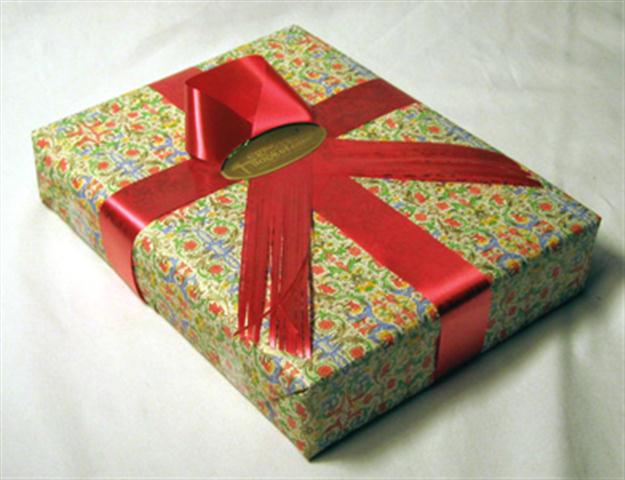

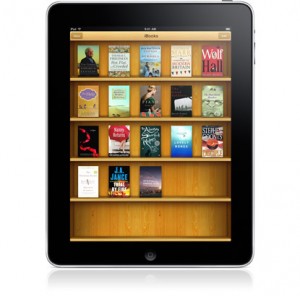 The European Commission has begun formal antitrust proceedings to determine whether five major international publishers (five of the big six U.S. houses) and Apple have "engaged in anti-competitive practices affecting the sale of e-books." The focus of the inquiry is agency pricing, which Apple has required for selling books on iBookstore, and which has been adopted in the U.S. by the five publishers named--Hachette, HarperCollins, Penguin, Simon & Schuster and Holtzbrinck--as well as Random House for all e-book sales here.
The European Commission has begun formal antitrust proceedings to determine whether five major international publishers (five of the big six U.S. houses) and Apple have "engaged in anti-competitive practices affecting the sale of e-books." The focus of the inquiry is agency pricing, which Apple has required for selling books on iBookstore, and which has been adopted in the U.S. by the five publishers named--Hachette, HarperCollins, Penguin, Simon & Schuster and Holtzbrinck--as well as Random House for all e-book sales here.
Under the agency plan, usually the publisher determines the price of the e-book and the retailer, acting as a selling agent, takes a 30% share of the sale. The agency plan has been fiercely fought by Amazon and widely applauded by many independent booksellers and others in the industry who fear that bargain basement prices for e-books will harm the industry.
Jeff Belle, v-p of Amazon Publishing, said that the company plans to "expand our publishing business in this area. We believe the children's book market segment presents a unique opportunity to innovate in both print and digital formats. And since many of these titles are not readily available as e-books, we see a chance to connect a terrific group of authors and illustrators with more readers. We also see the potential for similar deals across other categories in the future."
Marshall Cavendish will now concentrate on its k-12 textbook and assessment books business in the U.S. and expand its school education publishing businesses worldwide.
 Here's a new low for Amazon.
Here's a new low for Amazon.On Saturday, for one day, Amazon is offering consumers a 5% discount, up to $5, off as many as three purchases, if they compare prices using Amazon's Price Check phone app in a store, according to the Wall Street Journal's AllThingsD blog. The deal applies to toys, electronics, sporting goods, music and DVDs, but not books.
The promotion aims to encourage consumers to use the Price Check app, which allows users to scan bar codes, take pictures of an item or search by name--and gives Amazon information about other retailers' pricing. Of course, it also encourages the trend of people browsing in bricks-and-mortar stores, finding something they want, but then buying it from a competitor online.
"We scour online and in-store advertisements from other retailers, every day, year-round," Sam Hall, director of Amazon Mobile, said. "Now, we are enabling customers to use the Price Check app to share in-store prices while they search for the best deals."
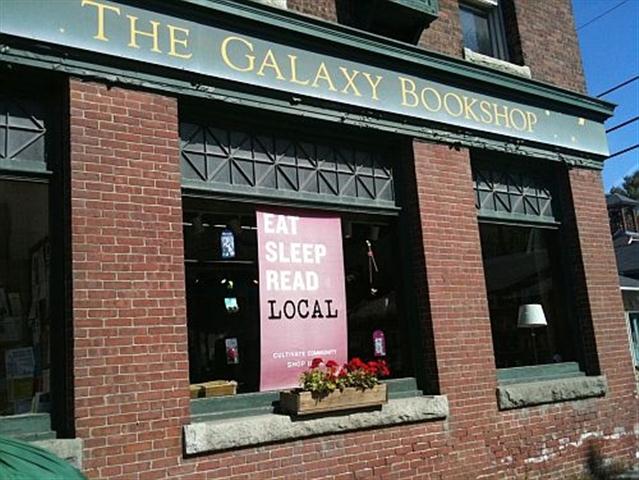 Next month, the Galaxy Bookshop, Hardwick, Vt., "will swap spaces with the Center for Agricultural Economy, and we will have a new home between the Buffalo Mountain Coop and Claire's Restaurant & Bar," wrote owner Linda Ramsdell in a letter to "customers, friends and neighbors." While acknowledging the myriad challenges faced by indie booksellers, she expressed excitement about relocating to "an area with more foot traffic, and especially at the possibilities for events in partnership with Claire's. Indeed, the new space will be smaller, but we are looking forward to inhabiting a retail space well suited to our inventory."
Next month, the Galaxy Bookshop, Hardwick, Vt., "will swap spaces with the Center for Agricultural Economy, and we will have a new home between the Buffalo Mountain Coop and Claire's Restaurant & Bar," wrote owner Linda Ramsdell in a letter to "customers, friends and neighbors." While acknowledging the myriad challenges faced by indie booksellers, she expressed excitement about relocating to "an area with more foot traffic, and especially at the possibilities for events in partnership with Claire's. Indeed, the new space will be smaller, but we are looking forward to inhabiting a retail space well suited to our inventory."
Ramsdell recalled opening Galaxy 23 years ago "in the small space I rented in The Old Firehouse. I had a cash register set on a card table, volumes of Books in Print given to me by the East Craftsbury Library, bookmarks I hand lettered at home at night, and several boxes of books, enough that ads in the Hardwick Gazette boasted 'over 100 titles in stock.' " More than two decades and a few additional moves later, "we find ourselves now in an entirely different bookselling environment," Ramsdell noted.
Having recently encountered the term "optimism bias," she said has chosen to embrace it: "I believe there is too much at stake to do otherwise. I believe bookstores play a vital role in the life of a town or city. Bookstores are where people, books, ideas and information can swirl and find each other. I believe that they are places of civic engagement that we cannot afford to lose. They are places where kids run around and scream about their favorite books, people meet the author they have long admired, customers connect with each other about books, and booksellers array collections of books for customers to respond to. It is my belief that a bookstore in downtown Hardwick still belongs."
Late last month John Mutter of Shelf Awareness spent two days with New England Independent Booksellers Association executive director Steve Fischer visiting bookstores in Connecticut, Rhode Island and Massachusetts. It was a great little working vacation! Here's the third part of a multi-part series reporting on what we saw.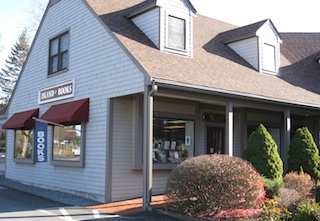 Like many happy independent bookstores, Island Books, Middletown, R.I. (next to Newport), had a Thanksgiving weekend to celebrate. Sales were up 40% over the same period last year and were the highest since before Barnes & Noble opened nearby in 2003, according to founder and owner Judy Crosby. "American Express tickets were through the roof on Saturday, so I know that was part of it, but my booksellers say there was a lot of talk about shopping locally." Happily, the sales bump has come after a solid summer but a fall that Crosby described as "quieter than I'd like."
Like many happy independent bookstores, Island Books, Middletown, R.I. (next to Newport), had a Thanksgiving weekend to celebrate. Sales were up 40% over the same period last year and were the highest since before Barnes & Noble opened nearby in 2003, according to founder and owner Judy Crosby. "American Express tickets were through the roof on Saturday, so I know that was part of it, but my booksellers say there was a lot of talk about shopping locally." Happily, the sales bump has come after a solid summer but a fall that Crosby described as "quieter than I'd like."
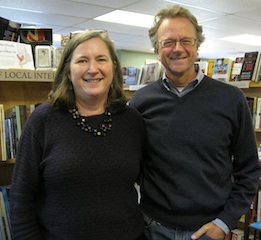 |
| Island Books founder and owner Judy Crosby and NEIBA executive director Steve Fischer. |
Crosby founded the store nearly 19 years ago and expanded it to its current 1,500 square feet of space when the B&N opened. She takes the digital challenge very seriously and just last month launched the store's IndieCommerce website. (The previous incarnation was a wordpress informational website.) She emphasizes that the store aims to compete with Amazon both in the sale of printed books and e-books, and she wants to educate customers about e-readers. "A lot of people don't realize that if they have a Kindle, they can't buy from us," Crosby said. "And a lot of people don't realize that there are other e-readers."
Front and center, the website has information about e-readers, including the tagline, "Want choice? Don't get left to their devices!" She has information about the new website in the store and in the store newsletter. Crosby is also setting up "informal tutorials" showing customers how to buy e-books from Island Books as well as give information about all things e-reader and e-book in time to influence customers' gift choices. (Crosby will do demonstrations on her Nook and iPad and possibly an Android device.)
She said early reaction was positive and that some customers have ordered books online already. Those who have bought printed books tend to like to pick them up and pay for them in the store.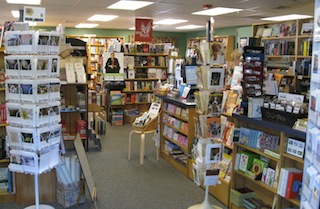 Strong areas in the store include children's, which does "very well, in all areas," Crosby said. The store also does well with fiction, history, biography, cookbooks, travel and knitting, perhaps in part because there is a knitting and beading shop in the shopping center where the store is located. (There's also a café as well as several offices.)
Strong areas in the store include children's, which does "very well, in all areas," Crosby said. The store also does well with fiction, history, biography, cookbooks, travel and knitting, perhaps in part because there is a knitting and beading shop in the shopping center where the store is located. (There's also a café as well as several offices.)
Crosby said that she is "always willing to try new sidelines because people like having an opportunity to buy something else in addition to books." Scarves have been popular, but candles did not sell brightly. One of the most popular categories is "candy, candy, candy," which Crosby has at the front counter. These include Rhode Island Rocks, a candy mix, as well as Belgian chocolate.
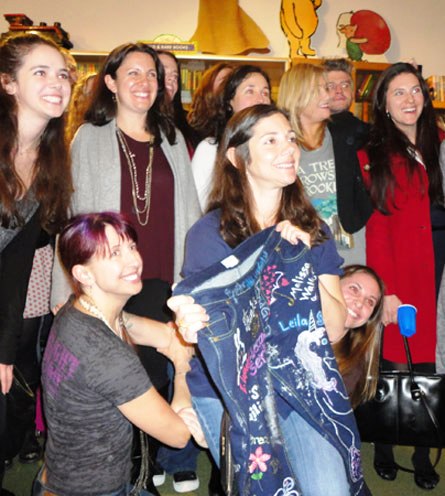
Throughout 2011, YA authors have been sending each other a pair of pajama jeans, taking pictures of themselves wearing it, and then sending it back out to another author. Last Saturday, nearly two dozen members of "The Twitterhood of the Butt Lifting Pajants" got together at Books of Wonder in New York City for a group signing--among them, Sisterhood of the Traveling Pants creator Ann Brashares, who first heard about the Twitterhood four or five months ago. "I thought it was funny and clever and very sweet," she said, "and I was very honored to have a connection to it." As the event drew to a close, and everyone gathered for a group shot, authors Lauren Myracle and Courtney Sheinmel hoisted Brashares aloft as she displayed the pajants. (For more pictures of the pajants' cross-country adventures, visit the group's Facebook page.) --Ron Hogan
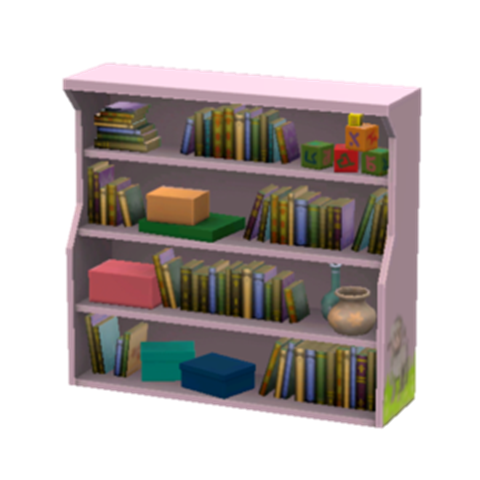 "We hope to fill a whole bookshelf for each family," said ACARC president Liz Yanoff. "These are things families like to have in their home, that they might not have had before. The ACARC is made up of teachers, librarians and educators who know the importance of reading, both in school and in the home.... This project is a natural extension of our mission."
"We hope to fill a whole bookshelf for each family," said ACARC president Liz Yanoff. "These are things families like to have in their home, that they might not have had before. The ACARC is made up of teachers, librarians and educators who know the importance of reading, both in school and in the home.... This project is a natural extension of our mission."The Best of the Rejection Collection: 293 Cartoons That Were Too Dumb, Too Dark, or Too Naughty for the New Yorker edited by Matthew Diffee (Workman). In the video, Diffee and other regular New Yorker cartoonists--Roz Chast, Sam Gross, Paul Noth, Marisa Acocella Marchetto--participate in a group therapy session on rejection and are eventually joined by New Yorker cartoon editor Bob Mankoff. As the video understates, "It did not go well."
Tomorrow on CNBC's Squawk Box: Donald Trump, author of Time to Get Tough: Making America #1 Again (Regnery, $27.95, 9781596987739).
---
Tomorrow on KCRW's Bookworm: Joan Didion, author of Blue Nights (Knopf, $25, 9780307267672). As the show put it: "After the deaths of husband, John Gregory Dunne, and her daughter, Quintana, Joan Didion wrote Blue Nights, the most personal and poetic book of her impressive career. We talk about aging, death and the act of complete surrender that this devastating book required."
---
Tomorrow on NPR's Diane Rehm Show: Michael Ondaatje, author of The Cat's Table (Knopf, $26, 9780307700117).
---
Tomorrow on Ellen: Bethenny Frankel, author of A Place of Yes: 10 Rules for Getting Everything You Want Out of Life (Touchstone, $16, 9781439186916).
---
Tomorrow on the Martha Stewart Show on the Hallmark Channel: Ryan Farr, author of Whole Beast Butchery: The Complete Visual Guide to Beef, Lamb, and Pork (Chronicle Books, $40, 9781452100593).
---
Tomorrow night on NPR's On Point: Patricia Cornwell, author of Red Mist (Putnam, $27.95, 9780399158025).
---
Tomorrow night on the Colbert Report: Jack Abramoff, author of Capitol Punishment: The Hard Truth About Washington Corruption From America's Most Notorious Lobbyist (WND Books, $25.95, 9781936488445).
---
Tomorrow night on the Late Late Show with Craig Ferguson: Laura Lippman, author of The Most Dangerous Thing (Morrow, $25.99, 9780061706516).
 A new trailer has been released for Extremely Loud and Incredibly Close, Stephen Daldry's film version of the novel by Jonathan Safran Foer. Indiewire observed that the clip is "aiming straight for your mom's emotional center.... Yeah, this is as cloying as the U2-powered trailer that debuted earlier this fall and doesn't inspire much confidence. But we're hoping that the cast perhaps gives the some layers we're not expected." The film opens Christmas Day.
A new trailer has been released for Extremely Loud and Incredibly Close, Stephen Daldry's film version of the novel by Jonathan Safran Foer. Indiewire observed that the clip is "aiming straight for your mom's emotional center.... Yeah, this is as cloying as the U2-powered trailer that debuted earlier this fall and doesn't inspire much confidence. But we're hoping that the cast perhaps gives the some layers we're not expected." The film opens Christmas Day.
Greg Barker, a "war correspondent-turned-documentary filmmaker," has been hired to direct A Rope and a Prayer for HBO Films, Deadline.com reported. The project will be adapted from the book A Rope and a Prayer: A Kidnapping from Two Sides by New York Times correspondent David Rohde and his wife, Kristen Mulvihill. Michelle Ashford (The Pacific) is writing the script.
Each December, Shelf Awareness staff members choose their top books; today's list is by contributing editor Robert Gray.
Happy Life by David Budbill (Copper Canyon Press)
I've kept a copy of Budbill's Moment to Moment within reach for more than a decade. Happy Life is a worthy companion, with its wiseass, grumpy and soul-nourishing poems. This collection reminds me once again that the mischievous spirit of ancient Chinese poet Han Shan is still alive and writing in the Green Mountains of Vermont.
Sweet Heaven When I Die: Faith, Faithlessness and the Country in Between by Jeff Sharlet (Norton)
I like essayists who fully engage with their subjects; I don't want objectivity. Sharlet offers a perceptive, hard-edged exploration of faith in some of its contemporary manifestations ("We shared a belief that words are unstable, that learning to read is a process you can never be done with, because words are always changing.") Highly recommended.
Zazen by Vanessa Veselka (Red Lemonade/Cursor)
The world is going to hell. Get over it. While reading Zazen, I felt like Veselka was staring me right between the eyes and daring me to look away from her pages. I couldn’t. I became addicted to the narrator's voice ("You can't round off small numbers because there are universes inside them."), and that was that. Bring on the apocalypse.
Open City by Teju Cole (Random House)
Many compared Cole's novel to the works of the late W.G. Sebald. I'll buy a few shares of that stock, but the book easily stands on its own merits, particularly when Julius, a Nigerian immigrant and graduate student, is walking the at once eternally familiar yet always morphing streets of Manhattan and offers us a new pair of eyes through which to see his world, which is our world, too.
2030: The Real Story of What Happens to America by Albert Brooks (St. Martin's)
I'm not sure what I expected from actor/filmmaker Brooks as a novelist, but I loved this speculative glimpse into an unsettlingly foreseeable future where--speaking as one of those evil, aging Baby Boomers who apparently have ruined the country for the rest of you--the enemy turns out to be us. Sorry.
Apricot Jam: And Other Stories by Aleksandr I. Solzhenitsyn (Counterpoint)
If anyone is still reading 500 years from now, I believe Solzhenitsyn will be one of the writers whose work survives those intervening, undoubtedly turbulent, centuries. This new collection of interconnected stories, written after his return to Russia in the 1990s, is an important addition to his legacy. It's also a great read.
Townie by Andre Dubus III (Norton)
Something that many of the books I loved had in common was an unflinching look at the often blurry, yet unforgiving, line between "ordinary" people and outsiders. Dubus's chronicle of his early years is eloquent and tough, as is his take-it-or-leave-it advice: Whether you're fighting or writing or just getting through the day, do so as if your life depends on it.
1Q84 by Haruki Murakami (Knopf)
Reality seemed to bang hard against fantasy among my favorite reads this year, and Murakami's novel certainly fits the pattern. The intricate weaving of characters, story lines and an alternate yet parallel "year" was intriguing to me, as was his deft mixing of Tokyo life and culture with Western literature and music.
Life by Keith Richards (Hachette Audio)
Life, indeed. If somebody had told me in 1965 that Keith Richards would write a memoir four decades-plus later, I don't think I'd have believed 1) he could write, or 2) either one of us would live this long. The book is great, of course, reflecting Keith's intelligence and overall "Keithness." But the audio version, read by Johnny Depp, Joe Hurley and Richards, is the real treat.
The Night Circus by Erin Morgenstern (Random House Audio)
Read by the incomparable Jim Dale, Morgenstern's novel delves into the reality of magic, the magic of reality, and all those places--scary and beautiful, hidden and right in front of your eyes if you look closely--that we have known about since childhood. Reader, I suspended disbelief and joined Le Cirque des Rêves.
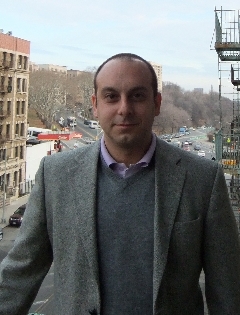 From handselling his books on the streets of New York City to having his first novel, The Last Block in Harlem, published and read across the globe, Christopher Herz has not taken the traditional literary route. His new novel, Pharmacology (AmazonEncore, December 6, 2011), is set in San Francisco in 1993; Sarah Striker, recruited by pharmaceutical companies to help advertise products to the young and hip, begins a zine called Luddite, where she exposes secrets behind the pharmaceutical industry. Herz lives with his wife in Brooklyn.
From handselling his books on the streets of New York City to having his first novel, The Last Block in Harlem, published and read across the globe, Christopher Herz has not taken the traditional literary route. His new novel, Pharmacology (AmazonEncore, December 6, 2011), is set in San Francisco in 1993; Sarah Striker, recruited by pharmaceutical companies to help advertise products to the young and hip, begins a zine called Luddite, where she exposes secrets behind the pharmaceutical industry. Herz lives with his wife in Brooklyn.
On your nightstand now:
The Singularity Is Near by Ray Kurzweil; The Dharma Bums by Jack Kerouac; The Gospel of Hip Hop by KRS-One; Here Is New York by E.B. White.
Favorite book when you were a child:
The Outsiders by S.E. Hinton. I remember finishing that book and feeling so sad that it was over. That I couldn't turn any more pages made me understand something, though I couldn't quite get it. Stay Golden Pony Boy!
Your top five authors:
Milan Kundera, Hunter S. Thomson, Paulo Coelho, Iceberg Slim, Jack Kerouac.
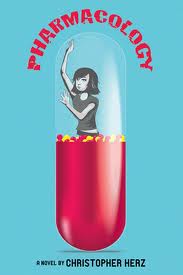 Book you've faked reading:
Book you've faked reading:
Gravity's Rainbow (and anything really) by Thomas Pynchon. Not sure why I could never make it through. Everyone says it's amazing. Not sure he really exists.
Book you're an evangelist for:
Shantaram by Gregory David Roberts. You get an inside look at India. The reason we're fighting in Afghanistan. Mafia. Love. 900 pages in all, and never one that drags.
Book you've bought for the cover:
Miles: An Autobiography. Just saw this crazy picture of Miles Davis on the cover and bought it. Thing is, there was no music coming out of the pages. Turns out only his trumpet can tell the story.
Book that changed your life:
Ralph Ellison's Invisible Man. For me, the definition of a novel is that. Everything is there. Everything.
Favorite line from a book:
"Once the writer in every individual is realized, we are in for an age of universal deafness and lack of understanding." --Milan Kundera, The Book of Laughter and Forgetting
Book you most want to read again for the first time:
Fear and Loathing in Las Vegas by Hunter S. Thomson. I finished reading that at night against the wall of the Palace of Fine Arts in San Francisco. Never laughed so hard from words on a page or nodded to myself that something was so true.
How social media can help writers connect with readers:
I've used Skype to join and talk to book clubs from Dubai to the U.K. to Australia to Alabama. The ability for a writer to connect with the audience these days is amazing. I'll be having a glass of wine at night in Brooklyn, and somewhere in a living room in Sun Prairie, Wisconsin, they'll be doing the same. An hour later, we're all so into each other. Crying, laughing. Did I mention drinking?
Writing is often such a solitary exercise, to be able to engage so deeply is incredibly rewarding. Social media, if used correctly, can really bridge that ever-present gap between reader and author. They can ask questions they've always wanted to know, and, for me, I can discover secrets I had no idea existed in my book.
Selected new titles appearing next Tuesday, December 13:
Locked On by Tom Clancy and Mark Greaney (Putnam, $28.95, 9780399157318) is the latest espionage thriller featuring Jack Ryan.
Kill Switch by Neal Baer and Jonathan Greene (Kensington, $25, 9780758266866) marks the debut of Claire Waters, a forensic psychiatrist with a troubled past and an affinity for difficult criminal cases.
Cabinet of Earths by Anne Nesbet (HarperCollins, $16.99 Hardcover, 272p., ages 10-up, 9780061963131, January 3, 2012)
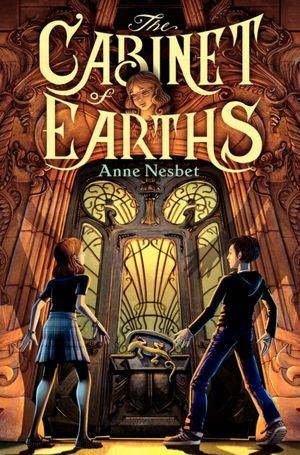 This debut novel of intrigue, family betrayal and an unsolved case of missing children will grip readers from first page to last.
This debut novel of intrigue, family betrayal and an unsolved case of missing children will grip readers from first page to last.
In 1944 Paris, a youthful woman acts as keeper of the Cabinet of Earths, filled with beautiful bottles. Each bottle contains the "earth" of a person and holds time at a standstill; as long as his or her earth remains in its bottle, the human being will not age. But when one of the Keeper's sons betrays the other, she embraces her mortality and bequeaths her vocation to her four-year-old grandson, Henri-Pierre Fourcroy. Slave to the cabinet and now in his 60s, Henri awaits a worthy successor. Enter 13-year-old Maya Davidson, whose family heads from California to Paris for her father's work as a scientist and to fulfill her mother's wish after a challenging battle with cancer.
First-time author Anne Nesbet goes to town with elements of French history, including drawing upon two real scientists, Antoine Lavoisier, who was active in the French Resistance, and his apprentice, Antoine Fourcroy. Maya, who is not taken in by the "beautiful people" at her school, led by a teen she calls "Dolphin" (her mispronunciation of "Dauphin," a remnant of the old French monarchy), strikes up a friendship with Valko, a transplant from Bulgaria who's always up for adventure. Maya's gregarious five-year-old brother, James, leads her and Valko to all sorts of interesting people, including two feuding men named Henri Fourcroy--the one enslaved to the Cabinet and also his mesmerizing uncle--who turn out to be Maya's relatives. Maya's "invisible" Cousin Louise holds less appeal for the teen--until Maya realizes that Louise is central to unlocking the mystery of the beautiful people who never seem to age.
Nesbet explores the subtle distinctions between the ignored versus the invisible members of society, the price of beauty and immortality, and the sense of displacement both Maya and Valko experience. Valko compares himself to the Roman Bath ruins in a Parisian square: "the current Valko, the older Valko, and somewhere under everything, the ruins of Bulgaria!" The two friends' outsider status gives them a keener perception of the events going on around them. Readers will be swept along by the novel's swift pace and enjoy the mystery's unraveling with Maya and Valko as their companions. --Jennifer M. Brown
Shelf Talker: A first-time author takes readers to Paris, where a pair of teens unlocks a secret cabinet and a generations-old mystery.